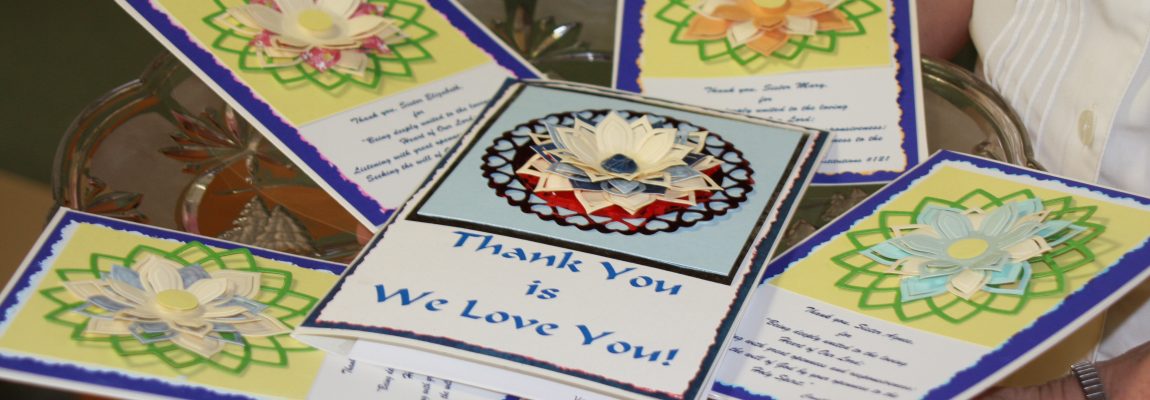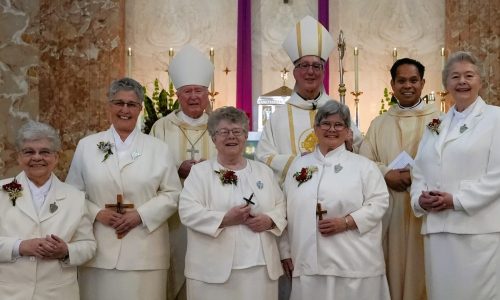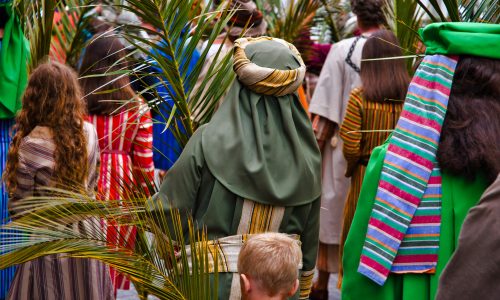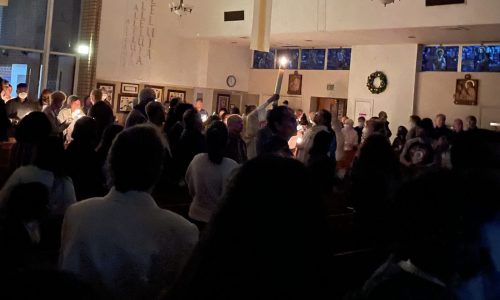by Sister Diane Heiss, SDSH
Thanksgiving is coming, and even though we may have a variety of different family traditions and ways to celebrate, “thanks” needs to be included. There are as many ways to say “thank you” as there are languages, with the following being just a few: Thank you. Gracias. Danke. Merci. Grazie. Tak. Salamat. Obrigado. Kiitos. Dankjewel. We can also express our appreciation with a smile, a friendly nod, a kind gesture and so on. No matter how we choose to express our gratitude for favors received, though, it is necessary to do so.
Our Pilgrim forebears in our country understood this and after their initial and perilous winter, in 1621 they celebrated with a feast in gratitude to God for their first harvest, joined by the Native American Wampanoag people. Our early Presidents also knew the necessity and importance of giving thanks to God for the many blessings that we as a nation had received. On Oct. 3, 1789, President George Washington issued his Thanksgiving proclamation. President Abraham Lincoln, exactly 74 years later, issued a similar proclamation in which he set the last Thursday of November as a national day for giving thanks and praise.
As Catholic Christians, though, our Thanksgiving celebration did not begin just a few hundred years ago, but rather nearly 2,000 years earlier.
In Greek, the word for “Thank you” is Ευχαριστώ (Efcharistó) or Eucharist. Jesus celebrated the first Eucharist with his disciples at the Last Supper on the night before he died. Taking the bread, he blessed and broke it, and gave it to his disciples, saying: “TAKE THIS, ALL OF YOU, AND EAT OF IT, FOR THIS IS MY BODY WHICH WILL BE GIVEN UP FOR YOU. … TAKE THIS, ALL OF YOU, AND DRINK OF IT, FOR THIS IS THE CHALICE OF MY BLOOD, … WHICH WILL BE POURED OUT FOR YOU … FOR THE FORGIVENESS OF SINS. DO THIS IN MEMORY OF ME.”
This is how much Jesus loves each of us. Over 1500 years ago, St. Augustine stated “God loves each of us as though there were only one of us.” It is said that the deepest hunger of the human heart is to love and be loved. Jesus calls each of us “My Beloved” and longs to give us his very self in Holy Communion. Are we ready to respond to His love?
At Mass, each Preface begins with these or similar words: “It is truly right and just, our duty and our salvation, always and everywhere to give you thanks, Lord, holy Father, almighty and eternal God, through Christ Our Lord.”
As we prepare to celebrate Thanksgiving this Thursday, let’s not forget where our deepest gratitude and thanks belong, to our loving God – Father, Son and Holy Spirit.
For your family:
■ To help your heart begin to grasp the enormity of God’s love for you, take some quiet time to pray with the Fourth Eucharistic Prayer of the Mass. Starting at the end of the Holy Holy, change all the plural words (e.g., we, him, them) to the first person (e.g., I, me, my). It will then sound something like this: “… you have fashioned me in your own image… you came in mercy to my aid … you did not abandon me … you so loved me, Father …”
■ Attend Mass together on Thanksgiving Day. If you are not able to receive Jesus in Holy Communion, make an Act of Spiritual Communion.
■ Prepare a special prayer service including a Litany of Thankfulness (e.g. Thank you, Lord, for …)
■ Write “Thank You” cards to those who help or bring joy to your life, whom you don’t often appreciate: (teachers, co-workers, those in public service or medical personnel, librarians, neighbors the elderly)
■ Call or write to family members, telling what you appreciate about them.
■ Invite someone to join you who would otherwise be alone at Thanksgiving.
■ Let the family prepare Thanksgiving dinner together, and enjoy eating!
Published in Orange County Catholic paper 11/13/2023 – Click for original article



